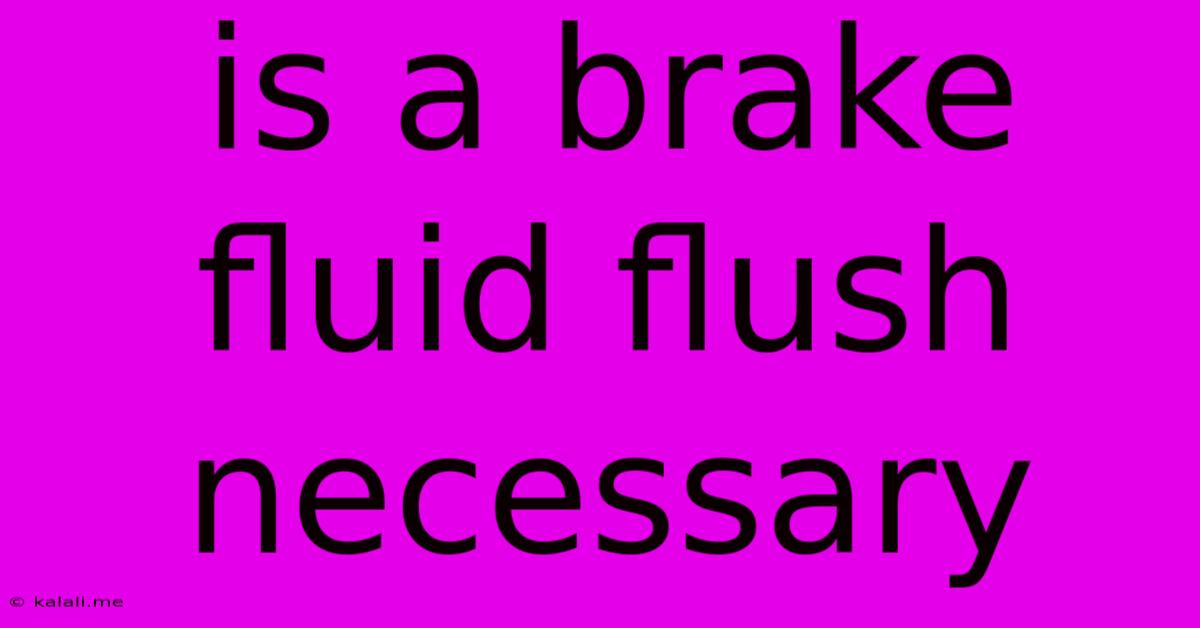Is A Brake Fluid Flush Necessary
Kalali
Jun 09, 2025 · 3 min read

Table of Contents
Is a Brake Fluid Flush Necessary? A Comprehensive Guide
Meta Description: Learn the importance of brake fluid flushes, how often they're needed, and the signs indicating it's time for this crucial maintenance task. We'll cover everything from the benefits to the potential consequences of neglecting this service.
Your car's braking system is arguably its most critical safety feature. While regular brake pad and rotor inspections are common knowledge, many drivers overlook the importance of brake fluid flushes. But is a brake fluid flush truly necessary? The short answer is a resounding yes. This seemingly simple maintenance procedure plays a vital role in maintaining the effectiveness and longevity of your braking system. This article will explore the necessity of brake fluid flushes, the signs indicating they're needed, and the potential consequences of neglecting them.
Understanding Brake Fluid and its Degradation
Brake fluid is a hygroscopic fluid, meaning it absorbs moisture from the air. Over time, this moisture contamination reduces the fluid's boiling point. Lower boiling points lead to brake fade – a dangerous condition where your brakes become less effective, especially during hard braking or extended downhill driving. This can significantly compromise your safety and increase your stopping distance. Additionally, moisture accelerates corrosion within the braking system's components, including calipers, master cylinder, and ABS (Anti-lock Braking System) modulator.
How Often Should You Flush Your Brake Fluid?
The general recommendation for brake fluid flushes is every two to three years, or every 24,000 to 36,000 miles (40,000-60,000 kilometers), whichever comes first. However, several factors influence the frequency:
- Climate: Humid climates accelerate moisture absorption, requiring more frequent flushes.
- Driving Habits: Aggressive driving and frequent hard braking increase the demand on the braking system and accelerate fluid degradation.
- Vehicle Age: Older vehicles may require more frequent flushes due to potential leaks or worn seals.
Signs You Need a Brake Fluid Flush
While adhering to the recommended schedule is best, several indicators suggest it's time for a flush:
- Spongy or Soft Brake Pedal: A soft or unresponsive brake pedal is a clear warning sign of potential brake fluid contamination.
- Brake Fade: A noticeable decrease in braking power, particularly during prolonged braking, indicates reduced boiling point due to moisture.
- Fluid Appearance: Checking the brake fluid reservoir reveals the condition of the fluid. Dark, discolored, or cloudy fluid is a strong indicator of contamination and necessitates a flush.
- Warning Lights: Your vehicle's dashboard might illuminate a brake warning light, signaling potential issues within the braking system, including contaminated brake fluid. This warrants immediate professional attention.
- Unusual Noises: Grinding or squealing sounds emanating from the brake system could suggest issues related to brake fluid contamination or component failure.
Consequences of Neglecting Brake Fluid Flushes
Ignoring brake fluid flushes poses several serious risks:
- Brake Failure: Extremely contaminated brake fluid can lead to complete brake failure, resulting in accidents.
- Corrosion: Moisture in the brake fluid corrodes internal components, leading to expensive repairs or replacements.
- ABS Malfunction: Moisture can damage the ABS modulator, compromising its functionality.
- Reduced Fuel Efficiency: Compromised braking efficiency can lead to increased stopping distances, requiring more forceful and prolonged braking, impacting your gas mileage.
Conclusion: Prioritize Safety with Regular Flushes
Regular brake fluid flushes are not just a recommended maintenance procedure; they're a crucial safety measure. By adhering to the recommended schedule and paying attention to warning signs, you can significantly reduce the risk of brake failure and maintain the peak performance and longevity of your vehicle's braking system. Ignoring this seemingly minor service can have severe consequences, so prioritize your safety and schedule a brake fluid flush today.
Latest Posts
Latest Posts
-
Did Perry Mason Ever Lose A Case
Jun 09, 2025
-
All Shower In The House No Cold Water
Jun 09, 2025
-
Where Should Water Hammer Arrestors Be Installed
Jun 09, 2025
-
How To Hook Up A Gas Range
Jun 09, 2025
-
Error When Starting Dev Server Referenceerror Structuredclone Is Not Defined
Jun 09, 2025
Related Post
Thank you for visiting our website which covers about Is A Brake Fluid Flush Necessary . We hope the information provided has been useful to you. Feel free to contact us if you have any questions or need further assistance. See you next time and don't miss to bookmark.